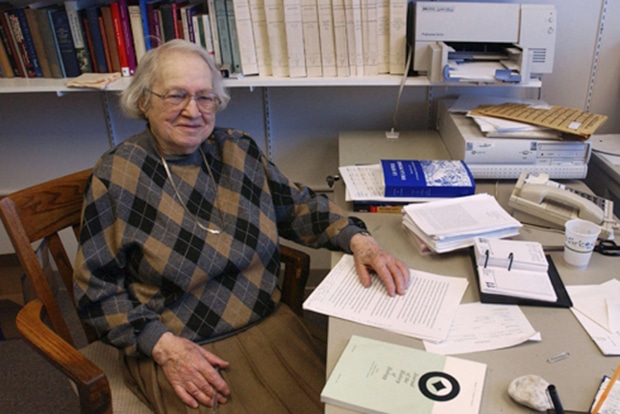An Outsider’s View
What would it have meant, for his day and for our own, if Waddington had allowed himself to complete that reflexive circuit, engage in the reciprocal imprinting with the little yellow chick that was his experimental subject, and reconceptualize his research in broader, more philosophically open terms? As Waddington himself once said, “the outsider sees most of the game.” 47 Philosopher Marjorie Grene claimed the outsider’s position at the Symposium (as the only philosopher and the only woman)—a position that was familiar.

Describing herself as “a kind of ethologist (or epistemenologist?) watching the conceptual behavior of the other animals,” Grene’s paper at the Symposium, “Bohm’s Metaphysics and Philosophy,” provided an insightful diagnosis of the rhetorical and conceptual challenges facing the Symposium participants. She characterized them as a group of “extremely ingenious and well-trained performers.” 48 Yet as she pointed out, when faced with a confrontation between two different ways of thinking, or two different paradigms: “one orthodox and relatively restricted (and restricting) in its scope, the other heterodox and comprehensive”—they seemed unable to comprehend its significance. Thus while the heterodox paradigm, Bohm’s “metaphysic of process, claimed to have “assimilate[d] and explain[ed] the truncated metaphysics of orthodox biology (and physics and computer science and psychology,” those who were still persuaded by the orthodox view (“which as a matter of fact flourishes exceedingly at present, rather like the horns of the Irish elk”) were unaware that they had been not merely bested, but engulfed by their rival. 49 Grene framed the result of the confrontation wittily: “It was—I hope—a case of evolution in action: where the species doomed to extinction, innocently unconscious of its lack of ‘fitness’, continues happily to perform its traditional rites.” 50
Grene further charged that the attempts at biological theory-building failed because they lacked three critical elements: “a concept of act, that is, of creative change of order;” an alternative to the “thoroughly functional” approach shared by all of the Symposium; and a strategy for apprehending “emergent orders” that focused not on “manipulation of means” but on “understanding.” 51 As she saw it, all interactionist explorations were quickly foreclosed from discussions and the affective and reflexive aspects of experimental science were abandoned. She attributed these omissions to “temperamental reasons: the passion for model making, and social reasons: the prestige and power granted to machine makers in our society”—and she summed up their effects bitterly: “To cut off mind from nature is to cut off subject from object, so sharply that science itself (the product, after all, of subjects) becomes irrational and reality meaningless. Science becomes computation-for-the-sake-of-prediction-for-the-sake-of-computation-for-the-sake-of-prediction . . ..” 52
Marjorie Grene’s clear critique of the Serbelloni Symposium reflected her own professional experience. “I have always been a maverick in philosophy,” Grene recalled in A Philosophical Testament, “taken, most of the time, with unacceptable minority positions, and also (as women so often have been) totally outside professional life for many years.” 53 A zoology major at Wellesley college, Grene had attended Heidegger’s lectures in Freiburg as an exchange student, and then earned her M.A. and Ph.D. at Radcliffe, “as close as females in those days got to Harvard […] Indeed, when I had passed my final orals for the doctorate I was told: ‘Goodbye; you’re a bright girl but nobody gives jobs to women in philosophy.” 54 Yet between 1944 and 1957, when she went to Manchester to work as Michael Polyani’s research assistant, she was involved mostly “with marriage, family, and farming.” Such marginalization may explain her conviction that “the more eminent a person is in academic philosophy, the more likely it is that he (or she) is a fraud.” 55 Philosophy, too, in her view, participated in an unproductive narrowing of the discipline, abandoning fields “with developing traditions capable, through experiment, theory, and/of observation, of adding to the body of human knowledge. 56 Enumerating them in A Philosophical Testament—the natural sciences, the social sciences, and finally psychology—she mournfully tabulates the results of their departure. “What we have left, as academic philosophers, is the history of our own literatures, conceptual analysis of disciplines beyond philosophy that throw up problems we can help with, or […] original reflection on fundamental, usually insoluble problems. The rest of our posturing is just plain rubbish, often fashionable, status-conferring, even […] money making rubbish but rubbish all the same.” 57 The same keen awareness of the ways disciplinary narrowing could constrain knowledge grounded Grene’s contribution to the Serbelloni Symposium.
Yet Grene’s surgical dissection of the Serbelloni discussion resulted only in her own excision from the conversation. Dismissed with merely an aside by Waddington, who turned “with a more serious comment” to David Bohm, Grene did not return to the final two Serbelloni Symposia. 58 Nevertheless, her intervention at Serbelloni diagnosed a problem that would come to characterize the development of twentieth and twenty-first century medicine and agriculture: an embrace of the functionalist, computational, and instrumental manipulation of living materials coupled with a refusal to consider, much less to address, how that process, in turn, is shaping us.
- Gilbert 1994.[↑]
- Marjorie Grene, “Bohm’s Metaphysics and Biology,” ed. C.H. Waddington, Towards a Theoretical Biology 2 Sketches, Edinburgh: Edinburgh UP, 1969) 61.[↑]
- Grene 1969: 61.[↑]
- Grene 1969: 61.[↑]
- Grene 1969: 61.[↑]
- Grene (1969: 62) also accused the Symposium discussion of “incoherence” grounded “not just in mind-body dualism, which has long since given way to a belief in matter-in-motion as the sole reality,” but in the “deep-lying divisiveness of our conceptual framework along a number of related lines.”[↑]
- Marjorie Grene, A Philosophical Testament (Chicago: Open Court, 1995): 2.[↑]
- Grene 1995: 5.[↑]
- Grene 1995: 2.[↑]
- Grene 1995: 3.[↑]
- Grene 1995: 3.[↑]
- To Grene, Waddington (1969: 69) merely joked “I know that the fashion of the time is very much against notions which have such transcendental-sounding names as Whitehead’s ‘eternal objects’; but I shall require convincing that David Bohm’s ‘timeless orders’ are either very different or much more likely to prove acceptable to the philosophical establishment.”[↑]




